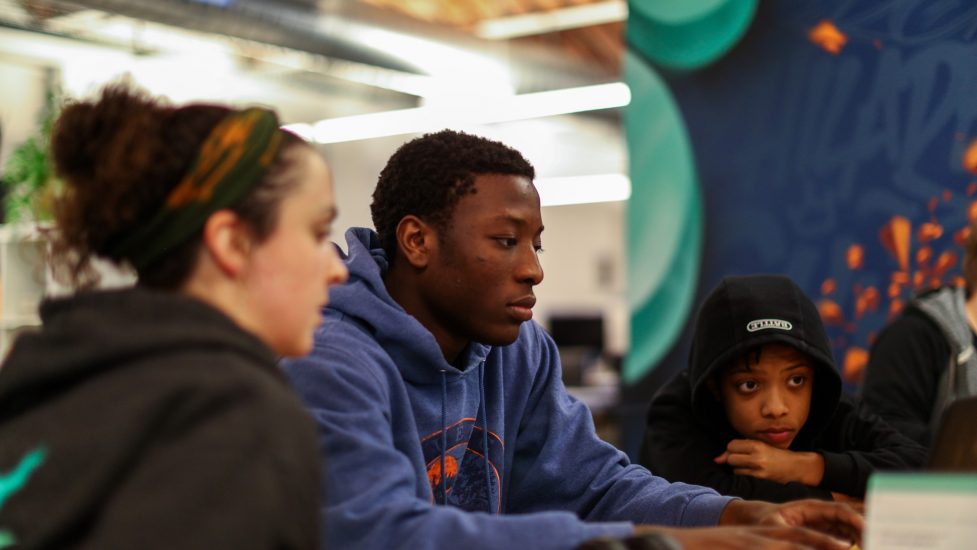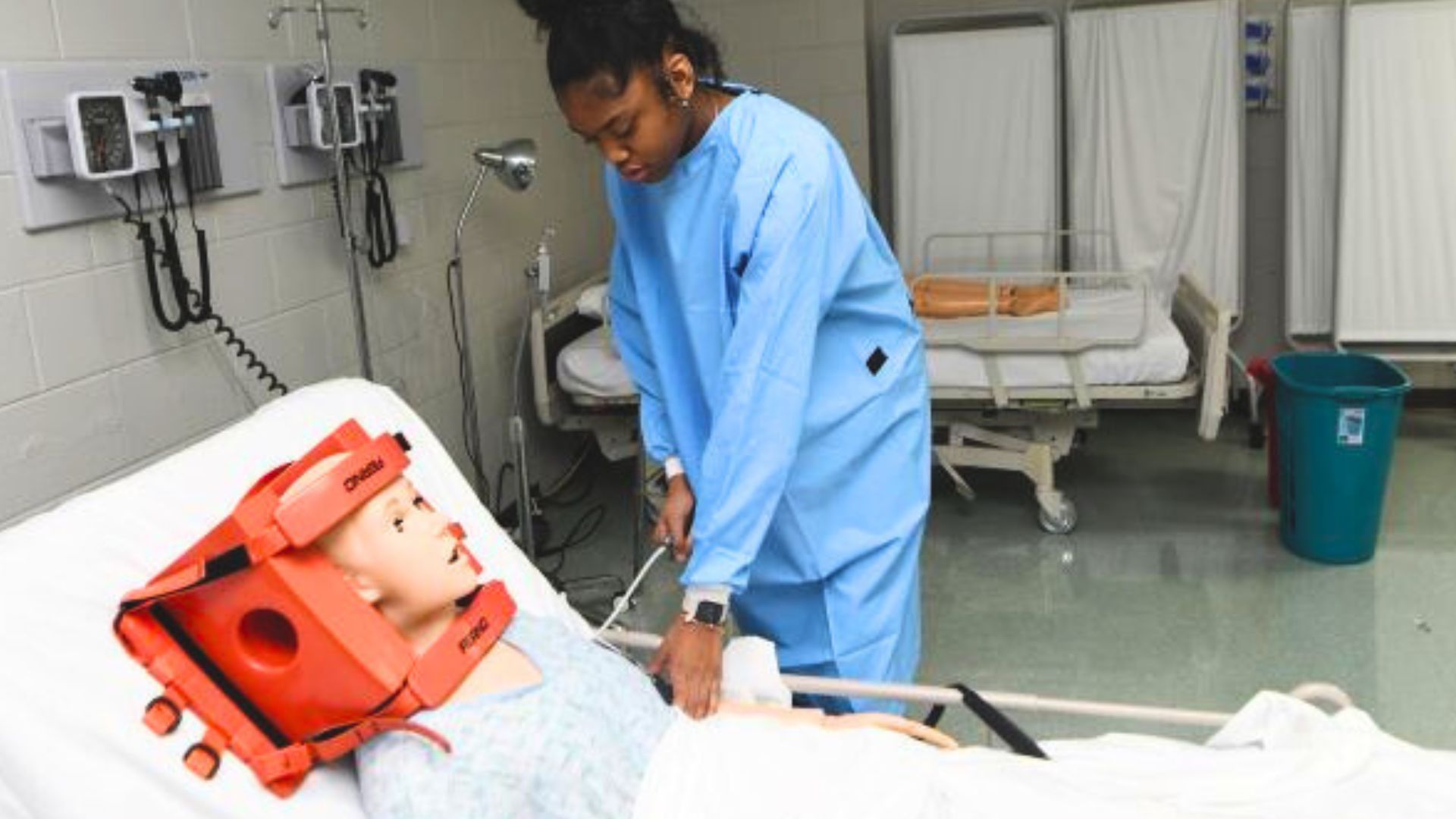It’s not enough to just learn about technology or to work in the industry. To make real change, one needs to lead and create. That’s the notion behind a Philadelphia-based nonprofit that combines coding and entrepreneurship to spark interest and innovation in students ages 8-18.

Coded by Kids (CBK) was founded by Sylvester Mobley, who grew up as a tinkerer, pulling things apart to see how they were built. After he served more than a decade in three branches of the U.S. military, he earned his bachelor of business administration at Temple University. As he entered the civilian workforce as a project manager for tech projects, and volunteered at a local recreation center for kids teaching web development.
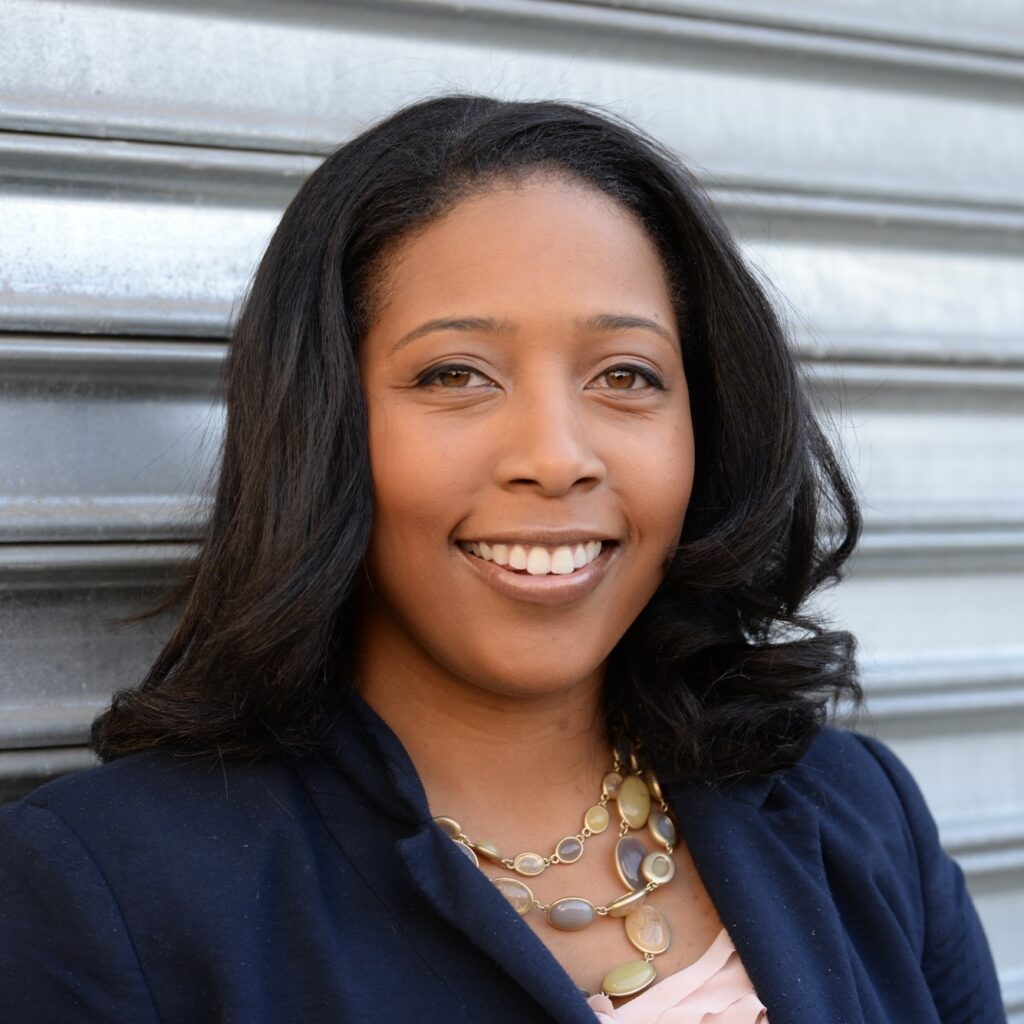
“Technology is just not a field that most Black and brown people see as possibilities for themselves,” says Danae Mobley, chief operating officer for Coded by Kids.
“Generally when people of color get into tech, they get pushed into lower level jobs in technology, like IT. Coded By Kids wants to provide an alternative to what we get thrown into – music, entertainment, sports,” she adds.
“Tech is what we teach, but it’s a conduit to helping underrepresented people build generational wealth and have sustainable careers.”
The interest in Sylvester’s rec center classes grew and he launched CBK as a nonprofit offering free programs from its office in University City in the Philadelphia area and in local schools.
Coding and technology classes are available for beginner to advanced skill levels. In addition to instructors, CBK partners with local companies and entrepreneurs who provide current and real-life perspectives of the industry.
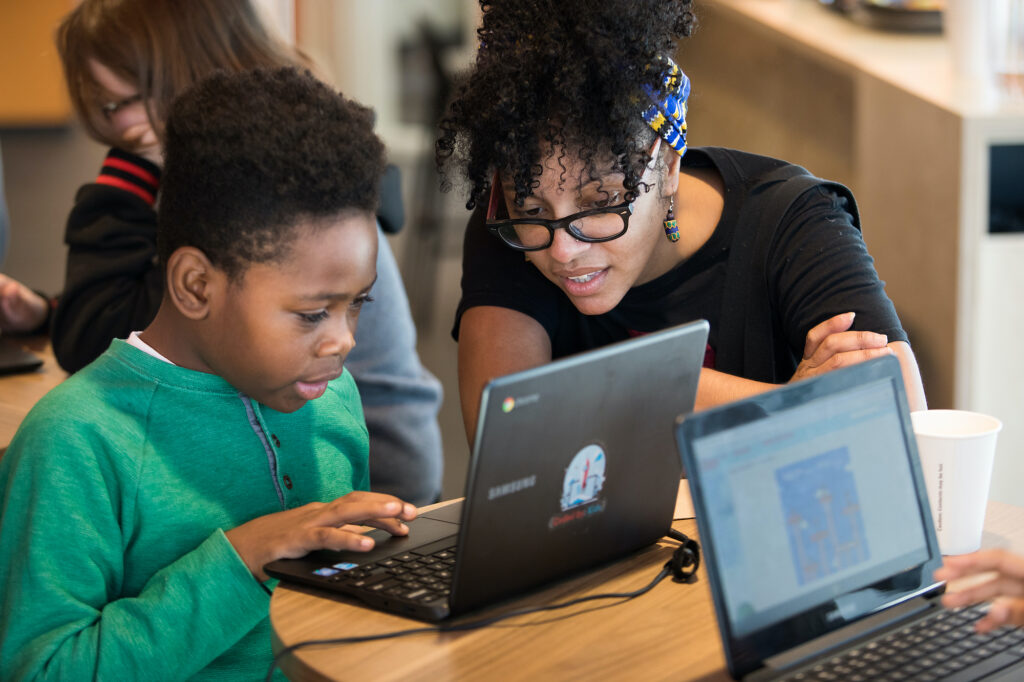
“Diverse representation means diverse experiences”
More than half of the students – 70% – are Black, Hispanic or Latinx. A third identify as female. CBK’s focus on diversifying the tech industry was a key draw for Felicite Moorman, co-founder and chief executive officer of Boss.Tech. Moorman is a resource and sponsor of CBK, and a mentor for students.
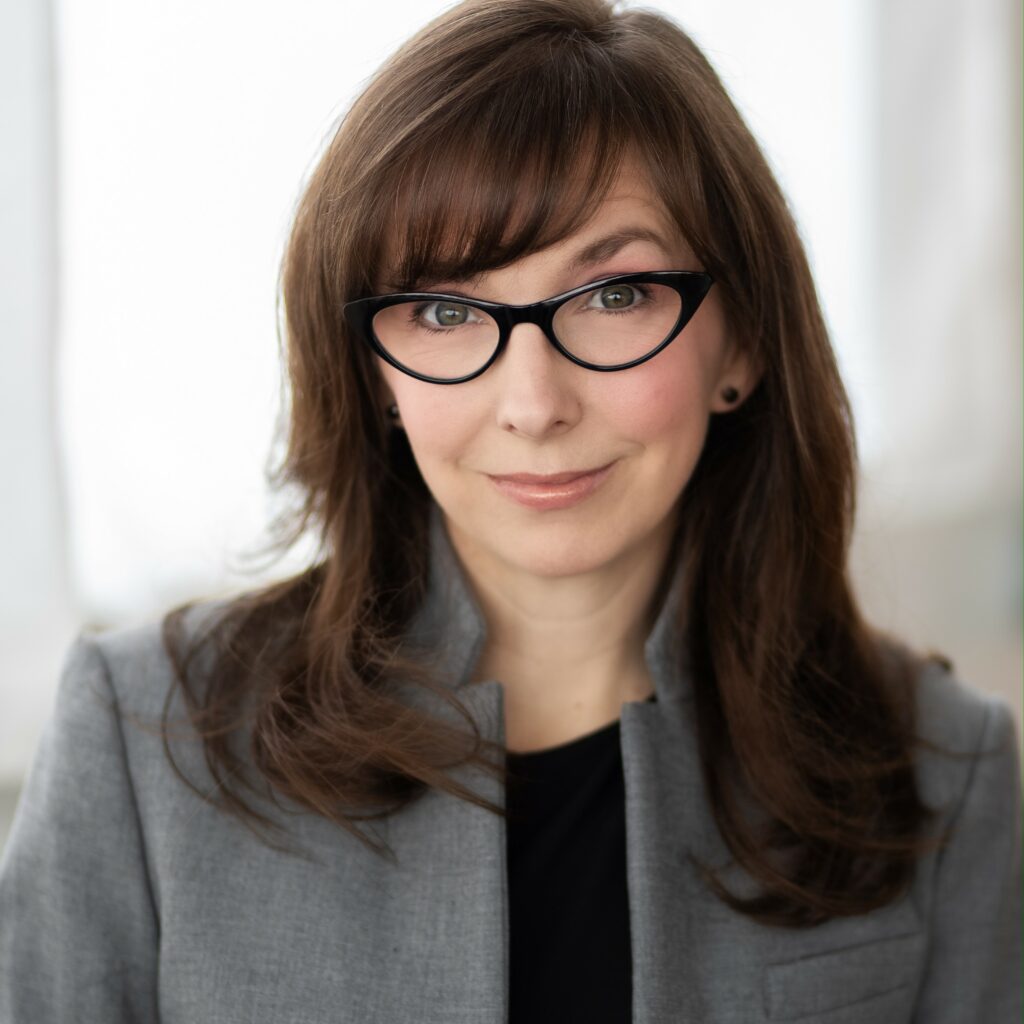
“Everything is better made with respectful friction. A lot has been said about the pitfalls of diversity without inclusion and I’ve learned a lot of hard lessons attempting to lead companies in Philadelphia. But learn and persevere for the business case,” Moorman says.
She adds, “Respectful friction enables innovation. The lack thereof enables group think. Execution may be faster but without innovation organizations are far less competitive. Diverse representation means diverse experiences, which means a variety of problem-solving methods and ideas, necessary to create innovative solutions.
“Done well, a focus on DEI is a competitive differentiator and advantage, and that’s a business case everyone should back.”
Competition Creating Opportunities
Moorman serves as a judge for competitions CBK hosts, which gives students an opportunity to win scholarships. Ctrl+Shift is a coding competition. A former winner, 17-year-old Tahsin Zaman’s idea was Philadelphia-focused and interactive. The high school junior says he wanted to build a website that included an experience accessible to almost anyone and incorporated machine learning, which is what he was learning at the time.

“I casually started going through everything I could look at to see what’s around me. What could I do?” he asked himself. “The leaf. The idea is something you can repeatedly do over and over again. It’s really cool to just be able to take a leaf and see what tree it came from.”
His idea: Trees @ Philly. Users take a photo of a leaf, share it on the site, and it will identify the tree it came from. The site also shares locations in the city where you can find those trees.
“Normally data is a huge issue with machine learning models, and you need lots data to have reliable model. There are leaves everywhere! Anyone has access. I just went outside and ripped leaves off of trees.
“Thankfully, there’s actually a place near my house, an old school I went to, that did a project there where they needed information. They put bar codes on trees and you can scan bar codes on the trees, so I had reliable data on trees and data,” Zaman says. “I wasn’t particularly fond of the outdoors, but now I am. It opened my eyes to variety of trees.”
Competition, Innovation, Mentorship
He recently participated in another CBK competition called Innovation League, which is an event Moorman supports. Akin to a sports league, students have coaches who lead them through weekly practices to develop their coding and entrepreneurship skills to solve problems in their community.
Students are presented with a list of “clients” to choose from. Zaman and his partner chose a high school student from a less affluent area of the city who said most of their peers found themselves in trouble or turning to crime because they didn’t have access to programs like CBK.
The duo is working on an app that connects students with opportunities at nonprofits. Modeled after the game Pokémon Go, users can see all the programs in their areas and go through the process of volunteering. If they do, they can log their hours into the app, which is converted into points. The points could ultimately be “cashed in” for scholarship money or other incentives like building skills such as public speaking or research; skills that can ultimately be used for life.
The name of the app, “Orbit – Launch Students’ Careers,” is to convey a larger-than-life idea. It won first place in the competition. A few nonprofits and program managers are already on board, and Zaman says he and his partner will reconnect with judges and CBK supporters to ask for donations.
In a month or two, Zaman says Orbit – Launch Students’ Careers will start small with 10 students who can earn up to a $500 or $1,000 scholarship. The ultimate goal is to make the app a sustainable business.
“Coded by Kids’ biggest impact on me is giving me the tools to take what I know and on a level beyond what I could imagine working on before,” he says.
“Working on something like Orbit, if I didn’t do the Innovation League, it wouldn’t have crossed my mind that I could do something this ambitious. It’s lots of students, donors, and money exchanged. Before participating with CBK, I would’ve been intimidated by that. But now I know that there’s a level, with the tools that CBK has provided me, that has given me the confidence that even I, as a high schooler, can look into this idea and hope to build out.”
Zaman is interested in pursuing a degree in technology after graduation. His dream schools include MIT and Stanford.

Shepherding Interested and Underrepresented Kids to Tech
“The (Coded by Kids) program is a standout because of the structured multi-year model and commitment to shepherding interested and underrepresented persons to technology leadership, exponentially impacting and improving access to the plethora of benefits of working in technology by creating not just technologists, but technology leaders who will organically pay it forward,” Moorman says. “And the kids are beyond awesome! The level of talent, commitment, and product is incredible.”
Before the pandemic, CBK enrolled 400-450 kids a year. Currently, 250 are participating. Since formally launching, Coded By Kids has worked with 1600 students.
“We want these kids to not only work in industry, but lead in industry,” Mobley says. “We want to be able to prepare them. They’re successful if they’re able to build their own startup or be CEO or CTO. We know not everyone will do that but if they have that ability to hone in and focus on leadership role and roles with high growth potential – software development as opposed to other field that do that – we’ll have more representation.”

